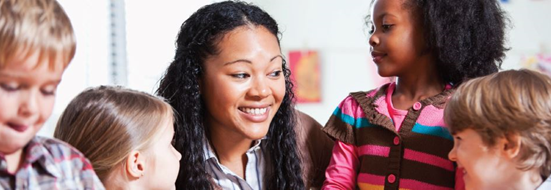 Gender and sexuality are often considered topics exclusively for adults, or at least for teens or pre-teens. But early childhood classrooms are rife with questions, interactions, and play that address and present opportunities to explore children’s and families’ ideas about bodies, identities, and relationships.
Gender and sexuality are often considered topics exclusively for adults, or at least for teens or pre-teens. But early childhood classrooms are rife with questions, interactions, and play that address and present opportunities to explore children’s and families’ ideas about bodies, identities, and relationships.
In the dramatic play corner: “You can’t play. You’re a boy and we’re playing princesses.”
In the bathroom: “I have a wee-wee. Why doesn’t she have anything there?”
In circle time: “You have to have a daddy. Everybody has a daddy.”
During pick-up: “Go hug your teacher goodbye.” “I don’t want to.”
During nap-time: “But it feels nice!” (says a masturbating child to an alarmed new teacher)
While often undiscussed by grown-ups, children are busy exploring their bodies: touching themselves during nap-time, watching other children use the bathroom, playing “doctor” during dramatic play. Young children are also engaging with, contesting, and internalizing gender stereotypes. Colors, toys, play, and families are all terrains on which gender lines are drawn and redrawn. Who can play what role, play with what toy, wear what item of clothing, or be a family are frequent topics for debate, and pose situations in which early childhood classrooms can become spaces where gender norms are further entrenched or, alternatively, where children develop a more expansive conception of identity.
In order to best support young children, we need to provide adults – both educators and family members – with opportunities to explore their own experiences, thoughts, and fears related to gender and sexuality. With space to discuss and reflect, caregivers and educators can lean into these situations, helping children challenge the limitations of gender stereotypes, explore the diversity of family structures, develop respect for other’s bodily autonomy, and empower children to feel a sense of ownership over their own bodies and choices. Instead of shushing a child who asks an uncomfortable question or shaming a child who is engaged in comfort touching (i.e. masturbation), we want to encourage children to be inquisitive, thoughtful, and comfortable in their own skins.
Early childhood presents tremendous opportunities to build not only the academic skills that children will need, but also the emotional and social orientations. What if, rather than waiting until college to talk with young people about sexual consent, we built the foundations for consent in early childhood classrooms? What if, rather than waiting to address homophobic or transphobic bullying in middle schools, we helped young children explore and challenge gender stereotypes in preschool classrooms? These are opportunities we cannot afford to pass up.
If you or your school are interested in exploring these topics, the New York Early Childhood Professional Development Institute offers workshops on gender, sexuality, and family in early childhood education for both educators and families. Please email Katie Schaffer at katherine.schaffer@cuny.edu or call her at 646-265-2044 for more information.
